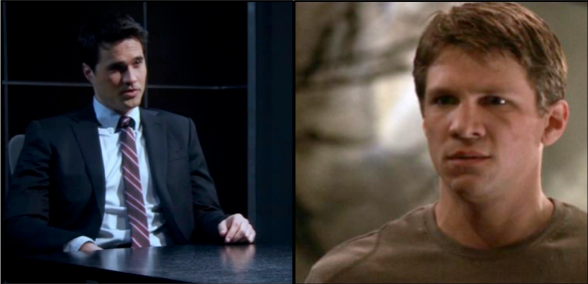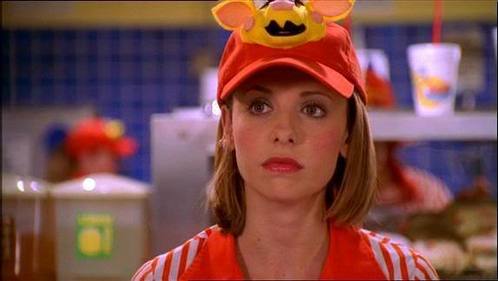By Sarah Gzemski
I’m a huge fan of Joss Whedon and of good TV. Personally, I’m a Buffy the Vampire Slayer kind of girl, but rest assured, I’ve been through all of Whedon’s TV work: Angel, Dollhouse, Firefly, and now, Agents of S.H.I.E.L.D. While S.H.I.E.L.D. may not be as immediately compelling as Whedon’s earlier series, so far it’s been an enjoyable show to watch, and the potential and possibilities are already there.

And let’s forget about how much Grant reminds me of Buffy’s Riley with their vanilla-government-agency-moral-superiority thing.
The similarities between S.H.I.E.L.D. and Whedon’s other shows are present: punchy dialogue, saving the world on a regular basis, a band of friends, the older, wiser guardian of Agent Coulson (like Mal, Firefly’s captain, or Giles, Buffy’s watcher/mentor). But despite the familiarities, the S.H.I.E.L.D. world is one that is entirely different, and even in conflict with, the other worlds of the Whedonverse.
We see over and over again how corporations and government agencies in Joss Whedon’s work are problematic and often in direct opposition to the heroes’ goals. What’s unique about Agents of S.H.I.E.L.D. is that our heroes are the government agency, and it’s this shift in perspective that I find interesting, confusing, and most worthy of development as the series continues.
The exploration of corporations in Dollhouse and Angel is connected to questions of morality. Dollhouse’s Rossum Corporation’s rents out dolls – people whose memories and personalities are wiped clean. The dolls are loaded with the memories and personalities desired by the people who pay to use them. The corporation’s actions inspire discussion of how far science can/should go, who gains from that advancement, and the ways in which we use people for personal gain. In Angel, the main recurring villain is the law firm Wolfram & Hart, who acts as a defense and power broker for demons and evildoers. In season five, Angel and friends decide to try to save people from the inside the international organization. They suddenly have much more power, but they are also forced to make choices about who to save and and are forced to make compromises in the form of deals with demons. This is again a backdrop, in front of which the heroes must decide whether they will achieve a greater good even if people they would usually rescue are sacrificed along the way.
Government agencies are another avenue through which Whedon’s shows discuss morality, and these organizations are even more relatable to the world of Agents of S.H.I.E.L.D. The characters in Firefly are literally outlaws, and the Alliance government is their natural enemy. The Alliance is a supergovernment (with hints of combined U.S. and Chinese culture throughout the series), and they’re willing to do anything to protect your secrets. The Wikipedia article on the subject notes that the Alliance “tends toward black ops and power-grabbing, although rarely more so than any real-world democracy.” The Alliance has us look at the way governments are corporatized and sneaky and the problems caused by keeping secrets.
The big government agency in Whedon’s work, though, is the Initiative, Buffy’s season four Big-Bad-producer. The Initiative is fully aware of the supernatural powers in the world and seeks to both contain and study them under the assumption that the world will be safer, much like the S.H.I.E.L.D. characters we’re seeing now. (Thus the Grant/Riley comparison.) The presence of the Initiative seems helpful and liberating for a while. (Buffy imagines that such an organization could allow her to stop fighting vampires and have a real life.) However, the Initiative can’t be saved from those who would seek to use it for evil. Professor Walsh uses her high position in the Initiative to create Adam, an amalgam of demon parts reminiscent of Frankenstein’s monster. When the experiment goes wrong and Adam begins to kill people, the entire agency’s good work seems to be destroyed. The Initiative’s good intentions do not equal good results, and seems to point to the idea of containing the supernatural as ultimately impossible.
Agents of S.H.I.E.L.D. doesn’t treat the organization for which it’s named as a perfect entity, rather it’s the setting through which these same questions of ethics and government power can be discussed. “Girl in the Flower Dress” was particularly illuminating, showing us more about the Rising Tide’s operation and about our Big Bad, Project Centipede. If the good guys are our S.H.I.E.L.D. agents, and our bad guys are Centipede, with the Rising Tide is caught in the middle. But the show’s stance on the Rising Tide and S.H.I.E.L.D. itself is a strange one, one that’s continuing to unfold.
In the first episode we see the agents enlisting/kidnapping (depending on your perspective) Skye, a member of the Rising Tide, now the line-straddler of the show. It’s clear to us that S.H.I.E.L.D. is not on board with the Rising Tide’s hacking and philosophy of information-sharing, a mission that is difficult not to compare to real life hacking groups like Anonymous, or the leaks from Edward Snowden about the NSA. It’s a mission that seems to be directly opposed to the government and its wants/needs, and at first it looks like the Rising Tide is going to be S.H.I.E.L.D.‘s enemy. After all, S.H.I.E.L.D.‘s secrets need to be kept in order to protect those affected by superpowers and also the general public.
To be fair, the show’s view toward these opposing missions is nuanced. Miles, Skye’s hunky boy toy and fellow Rising Tide hacker, was introduced to give the Rising Tide movement a more complicated face. Miles has all the ideology right: governments shouldn’t hide things from their people, we’re entitled to information; his intentions, like the Initiative’s, are good. As we find out later, he doesn’t stick to the freedom of information rhetoric, particularly the “free” part. He sold information to Project Centipede to make money, Skye is appalled at his behavior, S.H.I.E.L.D. takes away all of his access to technology.
S.H.I.E.L.D. doesn’t look great in their harsh treatment of Miles, but we as viewers realize that it’s necessary. After all, the information he sold Project Centipede made the agents’ jobs more difficult, led to the capture of Chan Ho Yin (“Scorch”), and ultimately, his death. The Rising Tide is caught in the middle, yes, but that doesn’t mean it’s neutral. The members of the Rising Tide, like Miles, are being used and misled by Project Centipede, and their good intentions still do not equal good results. In the end, this places them firmly on the “wrong” side.
While the ideological premise of the Rising Tide isn’t treated as stupid by most of our S.H.I.E.L.D. agent heroes, the message here seems to be that even if it’s a fine idea, the government has to come in and protect the information anyway. The secrets of the government are important to keep, just look at how much good can come from it. Sometimes, when it works, we can save the world. This seems to be in opposition to the message Whedon’s shows usually send about the ways organizations are used for evil. What are you trying to tell me, Joss Whedon?
Given the exploration of the same ideas of scientific ethics, government secrecy, and the containment of otherworldly power in other shows, Agents of S.H.I.E.L.D. is in a perfect position to explore the complexities of these issues. Previously, Whedon’s series have shown these dilemmas from the perspective of outsiders, or in even more fantastic settings more separated from the real world. S.H.I.E.L.D., on the other hand, takes place within a shadowy, secret-keeping organization, and is set in a world not too different from our own. By having S.H.I.E.L.D., a U.S.-centric agency as the backdrop, and placing comparisons to current events in the foreground of the show, Agents of S.H.I.E.L.D. might offer the perfect opportunity to explore more deeply Whedon’s thinking on this subject that has recurred so often in his body of work.
Sarah Gzemski is working toward her MFA in poetry at New Mexico State University but still finds time, sometimes, to think about other things. She thinks Deadshirt is pretty darn cool.


